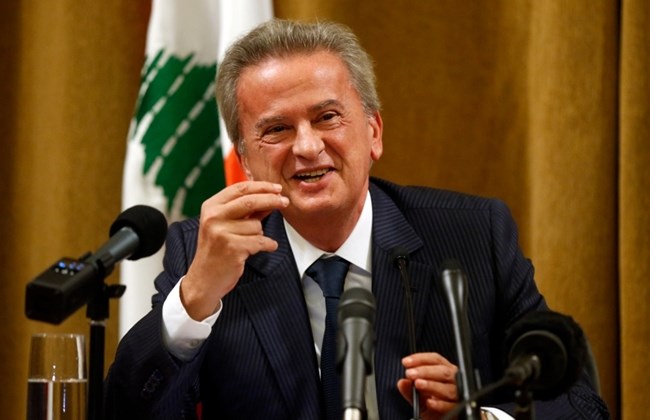Key points

* Central bank governor defends his record
* Denies he is to blame for financial crisis
* PM Diab blamed Salameh for currency crash
* State failure to reform is not c.bank’s fault -Salameh
* $20.9 billion remains in usable liquidity – governor
BEIRUT, Lebanese central bank governor Riad Salameh defended his record on Wednesday, rejecting criticism from the prime minister that he was to blame for a financial crisis and assuring savers there was no need for a haircut on their deposits.
Salameh has come under fire from critics including the powerful, Iran-backed Shi’ite group Hezbollah in recent days amid a rapid decline in the pound currency that has fuelled new protests and threatens broader unrest.
In a near hour-long televised address, Salameh deflected the blame back towards successive Lebanese governments for the unprecedented financial meltdown.
“Yes the central bank financed the state but it is not the one that spent the money. There are those who spent the money,” Salameh, in office since 1993, said. He said he was being targeted in a “systematic campaign”.
Lebanon, one of the world’s most heavily indebted states, defaulted on its foreign currency loans last month. The financial crisis which came to a head last October has led inflation and unemployment to soar. Savers have been frozen out of their dollar deposits amid a hard currency liquidity crunch.
In an attack on Salameh’s performance last Friday, Prime Minister Hassan Diab cast him as responsible for the currency’s crash, mounting losses in the banking sector, and for lack of transparency and coordination.
Salameh defended the central bank’s practices and said it did not hide information. Policies of financial engineering, which critics say resulted in Lebanon drawing dollars to the country at too high a price, had helped buy time to enact reforms to put the state finances on a sustainable footing.
LONG-STALLED REFORMS
“This engineering, we were forced to do it to buy time for Lebanon, so Lebanon could reform,” he said, adding that it was “not the responsibility of the central bank” if the state failed to enact agreed reforms.
Diab’s government was formed last January with the support of Hezbollah and has struggled to secure foreign financing tied to the long-stalled reform measures. It has received IMF technical assistance but has not requested a funded programme.
The U.S. State Department’s top Middle East diplomat David Schenker said to secure international assistance Lebanon “must prove that it is ready to make difficult choices and decisions to show it is 100% committed to reform”.
Fayssal Karame, a Hezbollah-allied MP, said Salameh’s speech did “not provide clear answers” to questions posed by Diab and the fears of Lebanese over their deposits and the exchange rate.
“He did not justify the monetary policies which he has followed for decades and which have proved to be failing,” Karame said in a tweet.
The Lebanese pound has lost more than half its value since October, falling away from the pegged rate of 1,507.5 pounds on a parallel market. Its descent picked up steam over the past week, hitting over 4,000 pounds to the dollar.
“We were not sitting watching,” Salameh said of the currency crash. “We worked with the exchange dealers and tried as much as possible to control the movement of the (dollar) price.”
A draft rescue plan that surfaced this month estimated $83 billion in banking sector losses and proposed a temporary contribution from depositors to help plug it.
Salameh said depositor money was safe.
“There is absolutely no need for a haircut and a haircut should not be adopted,” Salameh said. “We confirm to the Lebanese that their deposits are there and are in the banking sector and are being used.”
He defended the central bank’s independence and compared its practices to central banks around the world.
“Saying that circulars that come out of the central bank must be agreed by the Lebanese government is a violation of the independence of the central bank,” he said.
The central bank is still providing dollars at the official rate for imports of wheat, medicine and fuel. Salameh said this helped purchasing power.
He said $20.9 billion remained in usable liquidity.
Hezbollah’s deputy leader said on Tuesday Salameh was responsible for the pound’s collapse though not on his own.
(Reuters)

Leave a Reply
You must be logged in to post a comment.